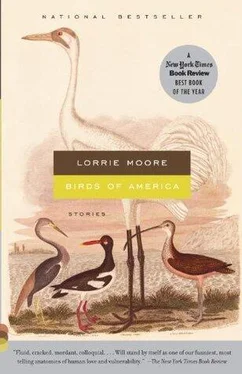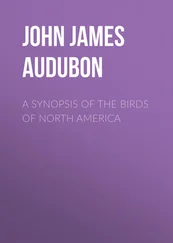“You want the number on the card? Three one one two …”
Quilty now turns to leave, without a soda, and heads for the door. But he chooses the wrong door. He wanders into the Playland by mistake, and Mack can see him thrashing around with his cane amid the plastic cheeseburgers and the french fry swings, lit up at night for the kids. There is no exit from the Playland except back through the restaurant, but Quilty obviously doesn’t know this and first taps, then bangs his cane against the forest of garish obstacles.
“… eight one zero zero six,” repeats the reservations clerk on the phone.
By the time Mack can get to him, Quilty is collapsed on a ceramic chicken breast. “Good night, Louise. I thought you’d left me,” Quilty says. “I swear, from here on in, I’ll do whatever you want. I’ve glimpsed the abyss, and, by God, it’s full of big treacherous pieces of patio furniture.”
“We’ve got a room,” says Mack.
“Fantastic. Can we also get a soda?” Mack lets Quilty take his elbow and then walks Quilty back inside, where they order Pepsis and a single apple pie the size of an eyeglass pouch — to split in the car, like children.
“Have a nice day,” says the boy at the counter.
“Thanks for the advice,” says Quilty.
They have brought along the game Trivial Pursuit, and at night Quilty likes to play. Though Mack complies — if that’s what you want to do, fine — he thinks it’s a dumb game. If you don’t know the answer, you feel stupid. And if you do know the answer, you feel just as stupid. More stupid. What are you doing with that stupid bit of information in your brain? Mack would prefer to lie in the room and stare at the ceiling, thinking about Chicago, thinking about their day. “Name four American state capitals named after presidents,” he reads sleepily from a card. He would rather try to understand the paintings he has seen that afternoon, and has almost understood: the Halloween hues of the Lautrecs; the chalky ones of Puvis de Chavannes; the sweet finger paints of the Vuillards and Bonnards, all crowded with window light and commodes. Mack had listened to the buzzing voice coming from Quilty’s headphones, but he hadn’t gotten his own headphones. Let a blind man be described to! Mack had his own eyes. But finally, overwhelmed by poor Quilty’s inability either to see or touch the paintings, he had led Quilty downstairs to the statuary, and when no one was looking, he’d placed Quilty’s hands upon the naked marble figure of a woman. “Ah,” Quilty had said, feeling the nose and lips, and then he grew quiet and respectful at her shoulders, at her breasts, and hips, and when he got down past the thighs and knees to her feet, Quilty laughed out loud. Feet! These he knew best. These he liked.
Afterward, they went to a club to hear a skit called “Kuwait Until Dark.”
“Lincoln, Jackson, Madison, Jefferson City,” says Quilty. “Do you think we will have a war?” He seems to have grown impatient with the game. “You were in the service once. Do you think this is it? The big George Bush showdown?”
“Nah,” says Mack. He had been in the army only during peacetime. He’d been stationed in Texas, then in Germany. He’d been with Annie: those were good years. Only a little crying. Only a little drinking. Later, he’d been in the reserves, but the reserves were never called up — everyone knew that. Until now. “Probably it’s just a sales demo for the weapons.”
“Well, they’ll go off, then,” says Quilty. “Won’t they? If it’s a demonstration, things will be demonstrated.”
Mack picks another card. “In the song ‘They Call the Wind Maria,’ what do they call the rain?”
“It’s Mar-eye-a, not Maria,” says Quilty.
“It’s Mar-eye-a?” asks Mack. “Really?”
“Really,” says Quilty. There is something wicked and scolding that comes over Quilty’s face in this game. “It’s your turn.” He thrusts out his hand. “Now give me the card so you don’t cheat.”
Mack hands him the card. “Mar-eye-a,” says Mack. The song is almost coming back to him — he recalls it from somewhere. Maybe Annie used to sing it. “They call the wind Mar-eye-a. They call the rain … Okay. I think it’s coming. …” He presses his fingers to his temples, squinting and thinking. “They call the wind Mar-eye-ah. They call the rain … Okay. Don’t tell me. They call the rain … Pariah!”
“Pariah?” Quilty guffaws.
“Okay, then,” says Mack, exasperated. “Heavy. They call the rain Heavy Rain.” He reaches aggressively for his minibar juice. Next time, he’s just going to look quickly at the back of the card.
“Don’t you want to know the right answer?”
“No.”
“Okay, I’ll just go on to the next card.” He picks one up, pretending to read. “It says here, ‘Darling, is there life on Mars? Yes or no.’ ”
Mack has gone back to thinking about the paintings. “I say no,” he says absently.
“Hmmm,” says Quilty, putting the card down. “I think the answer is yes. Look at it this way: they’re sure there are ice crystals. And where there is ice, there is water. And where there is water, there is waterfront property. And where there is waterfront property, there are Jews!” He claps his hands and sinks back onto the acrylic quilting of the bedspread. “Where are you?” he asks finally, waving his arms out in the air.
“I’m here,” says Mack. “I’m right here.” But he doesn’t move.
“You’re here? Well, good. At least you’re not at my cousin Esther’s Martian lake house with her appalling husband, Howard. Though sometimes I wonder how they’re doing. How are they? They never come to visit. I frighten them so much.” He pauses. “Can I ask you a question?”
“Okay.”
“What do I look like?”
Mack hesitates. “Brown eyes, brown eyebrows, and brown hair.”
“That’s it?”
“Okay. Brown teeth, too.”
“Really!”
“Sorry,” says Mack. “I’m a little tired.”
Hannibal is like all the river towns that have tried recently to spruce themselves up, make antique shops and bed-and-breakfasts from the shoreline mansions. It saddens Mack. There is still a despondent grandeur to these houses, but it radiates out, in a kind of shrug, onto a drab economy of tidbit tourism and health-care facilities. A hundred years of flight and rehab lie on the place like rain. Heavy rain! The few barges that still push this far upriver seem quaint and ridiculous. But Quilty wants to hear what all the signs say — the Mark Twain Diner, the Tom ’n Huck Motel; it amuses him. They take the tour of Sam Clemens’s houses, of Mr. Clemens’s office, of the little jail. They get on a tiny train Quilty calls “Too, Too Twain,” which tours the area and makes the place seem even more spritely and hopeless. Quilty feels along the wide boards of the whitewashed fence. “This is modern paint,” he says.
“Latex,” says Mack.
“Oooh, talk to me, talk to me, baby.”
“Will you stop?”
“Okay. All right.”
“Pretty dog,” a large woman in a violet dress says to them in the Tom Sawyer Diner. The diner is situated next to a parking lot and a mock-up of the legendary fence, and it serves BLTs in red plastic baskets with stiff wax paper and fries. Quilty has ordered his usual glass of milk.
“Thank you,” says Quilty to the woman, who then stops to pet Guapo before heading for her car in the parking lot. Quilty looks suddenly annoyed. “ He gets all the compliments, and I have to say thank you.”
“You want a compliment?” asks Mack, disgusted. “Okay. You’re pretty, too,” says Mack.
“ Am I? Well, how will I ever know, if everyone just keeps complimenting my dog!”
Читать дальше












